- Home
- Diane Gaston
A Lady Becomes a Governess Page 10
A Lady Becomes a Governess Read online
Page 10
‘You were marvellous with them, you know,’ she said.
His face grew warm from her praise.
She added, ‘I was quite in awe of you.’
‘I’m their guardian,’ he said stiffly. ‘I am supposed to treat them well.’
She laughed. ‘My brother was my guardian and he never treated me well.’
He stopped at the entrance to the hall. ‘I thought you said you had no relations.’
She paled. ‘I—I—he was my half-brother and—and—I do not credit him as a relation.’
That made sense. ‘After today, I am not certain I want to credit my brother as a relation either.’
She looked relieved. Was she that worried about his opinion of her?
‘It is not so unusual for a father to want sons, you know,’ she said.
Not all sons, just the heir. ‘I do not begrudge him the desire to have sons. God knows I wish he’d had a son, so the son could inherit.’ Garret frowned. ‘What I do not accept is his not wanting his daughters.’
‘Well, it is obvious you value them,’ she remarked as she examined a suit of armour on display.
Another compliment? He was not doing anything special that he could see.
He gazed at her as she moved from the armour to a Rubens painting. She was a puzzle, sometimes so very unlike what he expected a governess to be. When faced with a puzzle, who would not wish to solve it? The enigma she was only drew him in more.
He ought to be maintaining his distance. Instead, what had he done? He’d invited her to share dinners with him. He ate breakfast with her and, instead of giving the task to Mrs Dodd or Glover, he made himself her guide.
At least his nieces served as chaperons.
The clatter of little feet approached. The girls running. Why did Miss Tilson not tell them not to run, like any governess would? Not that Garret minded them running. Let them run through the house. He’d done so only when his father and the servants were not looking.
‘We are here, Uncle!’ cried Ellen.
‘So I have guessed,’ he quipped. ‘Shall we show Miss Tilson the gardens?’
‘The gardens!’ Ellen took his hand and pulled him towards the door.
Pamela and Miss Tilson followed.
He led them out the front door and through an archway, the entrance to a stone-walled garden.
When Miss Tilson walked through the entrance and saw the other side, she clapped her hands. ‘It is a topiary!’ She ran into the garden, laughing. ‘Look, Pamela and Ellen. Look at all the fanciful shapes!’
Her delight was too charming.
Ellen skipped after her and even Pamela walked briskly. Miss Tilson dashed from one sculpted bush to the other.
‘Look! An archway. Very like the stone one. Look! These look like silly hats.’
She dropped to her knees when she came upon the elephant which was quite a bit smaller than many of the others. ‘How clever. How very clever.’
Garret had always liked the topiary. He’d pretend some of the trees and bushes were soldiers and that the whole garden was a battlefield. That had been before he learned what a real battle was like.
‘Come!’ Miss Tilson took Ellen by the hand and gestured to Pamela. ‘Let’s run to the end of the garden!’
Ellen joined in eagerly. Pamela ran a few steps, then slowed to a walk.
Garret walked over to the gardener working in one of the squares with the cone-shaped topiary.
‘Phibbs!’ he called. ‘Good day to you.’
The man beamed. ‘Garret, my boy.’ He stood and doffed his hat. ‘I mean, my lord.’
Garret extended his hand. Phibbs had been tending the garden since he was a boy. ‘It is good to see you. You look unchanged.’
Phibbs rubbed his hip. ‘Some aches and pains, you know, but I cannot complain.’
Garret glanced towards Miss Tilson. ‘Your garden has a new admirer in the new governess.’
‘Governess, you say?’ The older man inclined his head towards her. ‘She looks a game one for the poor bab’es.’
A game one. An apt description.
‘She is indeed,’ Garret agreed. And very unlike what he’d expected for them.
* * *
Next Garret showed Miss Tilson the orchard, the kitchen garden and the fountain garden. On their own, without Miss Tilson’s leading them, the girls ran through the gardens.
Then Garret took them to the stables. The horses were in the paddocks and, as soon as Skiddaw saw him, he cantered up to the fence.
‘Oh!’ he heard Pamela exclaim. Her eyes were glowing.
‘Would you like to meet the horses?’ Garret asked her.
She nodded enthusiastically.
Ellen was not so certain. She hid behind Miss Tilson’s skirts.
Garret lifted Pamela on to the fence.
‘This is Skiddaw.’ Skiddaw came up to him for attention.
One of the mares approached Pamela and nudged her.
‘She wants you to pet her,’ Miss Tilson told the girl. She demonstrated. ‘Stroke her gently on the shoulder. She will love that.’
Pamela reached over the fence and stroked the horse just as Miss Tilson showed her. ‘Nice horse,’ she repeated soothingly.
When it came time to leave, Pamela had to be dragged away with the promise of a biscuit and milk when they visited the kitchens. The girls ran ahead and Miss Tilson fell into step next to him.
‘You need to buy them ponies,’ she said.
‘Ponies?’
She nodded. ‘Pamela, because nothing else has turned her into a normal little girl. And Ellen so she learns not to be afraid.’
Ponies.
‘We shall see,’ he responded, but he liked the idea.
‘They are old enough to learn to ride,’ she pressed on.
He turned to her. ‘Miss Tilson, you’ve convinced me.’
The smile she returned to him was as golden as this fine day.
* * *
By the time they reached the kitchen and Cook had given Pamela and Ellen a biscuit and milk, Rebecca was filled with energy and optimism. She knew it was because of the man beside her.
She marvelled at how he apparently attuned himself to others’ feelings. He always seemed to know the right question to ask, the right support to give. Of course, he’d been a bit cruel to her that third day on the road when he would not speak to her, but that was because of the kiss and the fault had been hers as much as his.
That lovely, thrilling kiss.
Rebecca stopped that thought. She must remember she was the governess and not Lady Rebecca.
She’d made a terrible slip, mentioning her brother. She must not do that again.
Mrs Dodd appeared in the kitchen while they were waiting for the children to finish their petit repas.
‘Good day to you, sir.’ Mrs Dodd curtsied to Lord Brookmore.
He smiled at the housekeeper. ‘How are you faring, Mrs Dodd? Are things running smoothly in the house? Any problems?’
The housekeeper spoke at length about the workings of the house and the needs of the servants. While she spoke, she gave Rebecca black looks.
How was Rebecca to get on Mrs Dodd’s good side? The woman had taken a severe dislike to her.
After Mrs Dodd finished and Lord Brookmore promised to look into some improvements she’d suggested, she and the kitchen servants went back to their work.
Rebecca approached Lord Brookmore. ‘Do we proceed with the tour?’ She hoped so. It was lovely to spend the day with him.
He darted a glance to the little girls. ‘Another time, perhaps. I think your charges are too fatigued.’
Her charges.
She should have realised. The little girls could hardly keep their heads up to finish their biscuits. ‘Yes, perhaps a rest is due. I su
ppose I should take them back to the children’s wing when they’ve finished eating.’
‘I’ll not wait,’ he said. ‘As long as I am on this wing, I want to stop by the dairy and the brewery. See how they are faring.’
He walked over to the girls to say goodbye to them. Their faces had lost that panicked look when he came near. He’d charmed them, as he’d charmed her.
She regretted losing his company.
She approached Mrs Dodd. ‘The house looks marvellously well kept, Mrs Dodd. It must take a great deal of co-ordination on your part.’
The compliment did not soften her. ‘I do my job.’
Rebecca became more direct. ‘Forgive me for saying so, but you seem unhappy with me. May I know why so I might make amends?’
Mrs Dodd looked her up and down. ‘You don’t seem like a proper governess to me. Riding next to the Viscount. Eating meals with him. He’s not for the likes of you, you know. People should remain in their stations.’
Her insinuation raised Rebecca’s hackles, perhaps because it was too near the truth. ‘I disagree, Mrs Dodd. I believe people—men and women—should rise as high as their talent, ambition and hard work take them. I do assure you, though, that I am here as governess for Miss Pamela and Miss Ellen. No other reason.’
‘Hmmph!’ Mrs Dodd exclaimed. ‘You’d better not have any other designs.’
‘I do not,’ Rebecca repeated.
Mrs Dodd turned and marched away.
Cook came up to her, drying her hands on a towel. ‘Do not pay her any mind, miss,’ she said. ‘She’s a stickler, she is.’ Cook inclined her head towards the doorway by which Lord Brookmore left. ‘What a fine man our Master Garret turned into. He was a rackety charver in his day, eh.’
‘Charver?’ she asked.
Cook seemed to search for a translation. ‘A rackety boy. Full of mischief.’
Rebecca nodded, repeating the word charver in her head so she would remember it.
She would also remember that Mrs Dodd thought her not a proper governess.
* * *
Back in the schoolroom, Rebecca was at a loss what to ask of the children, who immediately sat at what she suspected were their usual seats.
‘What would Miss Cooper have you do at this time of day?’ she asked them.
‘Different things,’ Pamela said unhelpfully.
‘Like what things?’ Rebecca asked.
The little girl shrugged.
‘We could play!’ Ellen suggested.
Somehow Rebecca did not think that was what Miss Cooper would have done.
She found paper and pencils and put them in front of each girl. ‘Why not write about what we did this morning?’
They looked at her blankly.
‘Why?’ Pamela asked in a suspicious tone.
‘Well.’ How to explain it was the only idea she’d come up with? ‘To remember it. Like in a journal. You write down what you did so you remember it.’
‘What is a journal?’ Ellen asked.
‘It is a book of blank pages that you write in about your day.’ Rebecca had kept a journal, but hers were now at the bottom of the Irish Sea.
‘But we do not have books with blank pages,’ Pamela said.
This child was too concerned with things being just so. ‘If you like doing this, I’ll buy you one, so you can keep a journal.’ She’d have to ask Lord Brookmore, she meant, but he would say yes.
‘Why would we keep a journal?’ Pamela asked.
‘To remember what you did,’ Rebecca replied. ‘But not only what you did, but how you felt about your experiences. Because, you may not realise it, but what you do and think and feel is important.’
Pamela’s eyes widened. ‘May I write about the horses?’
This was progress. ‘Of course you may. You may write about anything. You get to decide.’
‘I didn’t like the horses,’ Ellen said.
‘Well, then, write about something else.’
‘What?’ Ellen looked at Rebecca as if this was the hardest task ever asked of her.
‘Anything.’ Somehow Rebecca suspected Miss Cooper had never had this sort of problem when she gave the girls work.
Ellen just stared at her. Where was her imagination? At age seven, Rebecca was always making up stories.
‘Write about your favourite room in the house,’ Rebecca came up with. ‘What you saw in there.’
‘I’m not good at writing and spelling,’ Ellen complained.
‘I’ll help you.’ Rebecca pulled up a chair next to her.
Ellen wrote about her mother’s room, but every word she wanted to write she had to ask how to spell, making the task tedious for Rebecca, who at least kept a semblance of good humour. At least Ellen knew her letters. What would Rebecca do if Ellen had not known her letters?
Pamela apparently had a lot to say. She’d filled one page and was starting on another.
Rebecca breathed a sigh of relief that would be short-lived. After this task, what would they do next?
‘After this we’ll draw pictures of what we saw,’ she blurted out.
That would take up a little more time.
Chapter Nine
Later that day Garret stopped by the estate manager’s office. Ben was seated behind his desk, the desk his father used before him.
‘Garret.’ Ben rose to his feet and gestured to a chair. ‘Come in. Sit.’
‘I came to tell you that I’ve started what you suggested.’ Garret lowered himself into the chair. ‘I rode the property this morning.’ Because he could not sleep. ‘I saw some of the workers. Spoke to them.’
Ben nodded approvingly.
‘I’ve also talked to one of the gardeners, the stable workers, the house servants, the dairy and the brewery.’
‘All that?’ Ben blew out a good-humoured breath. ‘I did not mean for you to accomplish everything in one day.’
‘It was convenient to do so.’ Because he’d given Rebecca the tour, it had pushed him to be out among those who worked on the estate.
Ben’s expression turned to one of concern. ‘I hope you are not trying to cram this into a few days.’
Garret held up a hand. ‘I know. You want more than an appearance by me.’
‘It is not what I want,’ Ben stated. ‘It is what the estate needs. It needs your leadership.’
‘I’m not certain of that,’ Garret said. ‘But I want the estate to prosper. There are many people depending upon it.’
‘Precisely,’ Ben agreed.
* * *
Garret left Ben and returned to the house. When he climbed the stairs to his room, he had half a notion to take himself into the children’s wing to see how Miss Tilson was faring.
He’d see her soon enough at dinner.
He entered his bedchamber and let Brant help him change out of the clothes he’d worn all day. A clean change of clothes for dinner made him feel presentable. In his father’s and brother’s days, one dressed formally for dinner, but he’d feel foolish doing so to eat alone or with Miss Tilson, who did not have enough clothes to dress for dinner.
He was eager to see her, to hear what she thought about the house, the children, the horses.
But he should not be eager to see her.
In fact, he needed to write a letter. He must do so before dinner so he could send it in tomorrow’s post.
‘Thank you, Brant,’ he said to the valet who was brushing off his coat as if putting the finishing touches on one’s creation.
‘Very good, m’lord.’ Brant limped away.
Garret peered at him. ‘Are you in some difficulty, Brant?’
The valet looked puzzled. ‘Difficulty, sir?’
Garret pointed. ‘You are favouring one leg.’
Brant limped across the room to pick up Gar
ret’s discarded clothes. ‘Just a touch of the rheumatism, my lord.’
‘Perhaps you should rest. I can forgo your services for one night,’ he offered.
Brant shook his head. ‘I would not think of it, sir.’
He worried about this man. ‘Very well, but you must tell me when you do need rest.’
Garret left the valet and went down to the drawing room. He took paper, pen and ink from the desk and sat to compose a letter to Lady Agnes, explaining he would be remaining at the estate for unforeseen weeks.
While he put pen to paper he tried to remember what she looked like exactly. He knew she was blonde-haired and blue-eyed and that his father’s friends and advisors had enthusiastically supported a match between them, but she did not come alive in his memory.
Not like Miss Tilson.
He should limit his time with Miss Tilson. Not share breakfast with her and the children again. Rescind his invitation for her to dine with him. Keep his distance.
But if he did withdraw from her company, it would mean distancing himself from his nieces, too. He could not do that. Not now. Not when he’d made himself more important to them. Not when he learned of his brother’s treatment of them.
And he did not want to eat dinner alone.
He turned back to the pen and paper, managing a short note, suggesting Lady Agnes spend the summer at Brighton as she’d planned and where he was to have joined her, although Brighton held no appeal to him.
He sealed the letter and gave it to one of the footmen to see that it reached the post by tomorrow.
Glover announced dinner.
Garret entered the dining room, wondering if there was not a smaller room in which they might dine. This was the most convenient to the kitchen, though, and he was not about to inconvenience the servants any more than he had done by breakfasting with the children.
Miss Tilson was not yet there.
‘Was dinner announced to Miss Tilson?’ he asked Glover.
The man opened his mouth to answer when she came rushing in the door. ‘Yes, dinner was announced to me. I hope you haven’t been waiting long.’
‘Just arrived,’ he said.
She took the seat adjacent to his, where she’d sat the night before. Garret forgot all his self-warnings and simply enjoyed her company. They talked of what they each had done after the tour and she told him about the journals. He supposed journal writing was a good day’s lesson for them, but an unusual one. In any event, the time went swiftly and felt very companionable.

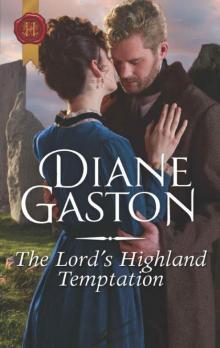 The Lord's Highland Temptation (HQR Historical)
The Lord's Highland Temptation (HQR Historical)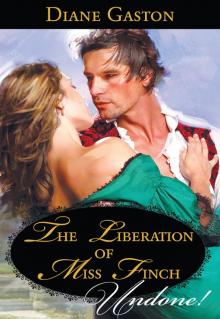 The Liberation of Miss Finch
The Liberation of Miss Finch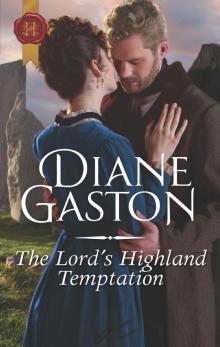 The Lord's Highland Temptation
The Lord's Highland Temptation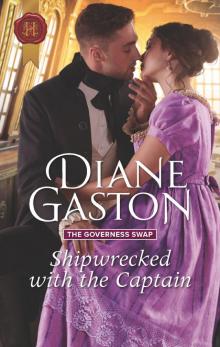 Shipwrecked with the Captain
Shipwrecked with the Captain Her Gallant Captain at Waterloo
Her Gallant Captain at Waterloo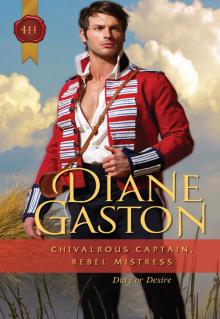 Chivalrous Captain, Rebel Mistress
Chivalrous Captain, Rebel Mistress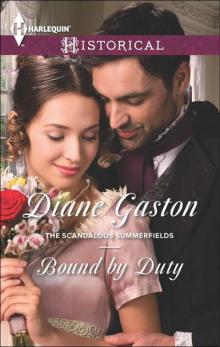 Bound by Duty
Bound by Duty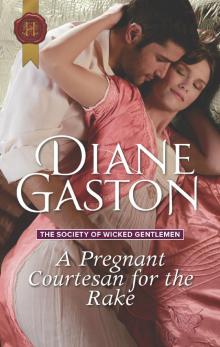 A Pregnant Courtesan for the Rake
A Pregnant Courtesan for the Rake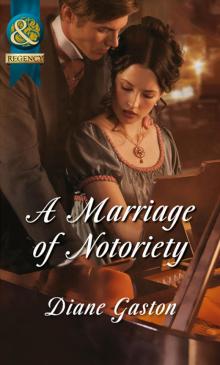 A Marriage of Notoriety
A Marriage of Notoriety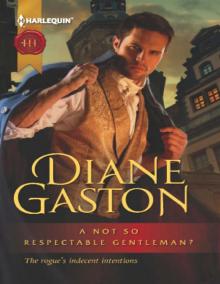 A Not So Respectable Gentleman?
A Not So Respectable Gentleman?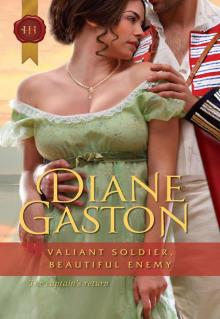 Valiant Soldier, Beautiful Enemy
Valiant Soldier, Beautiful Enemy A Reputation for Notoriety
A Reputation for Notoriety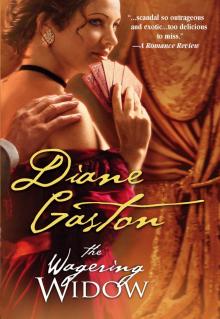 The Wagering Widow
The Wagering Widow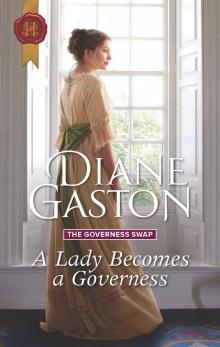 A Lady Becomes a Governess
A Lady Becomes a Governess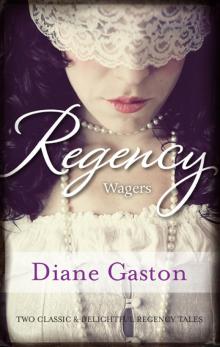 Regency Wagers
Regency Wagers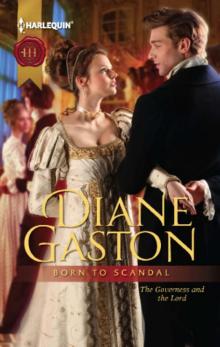 Born to Scandal
Born to Scandal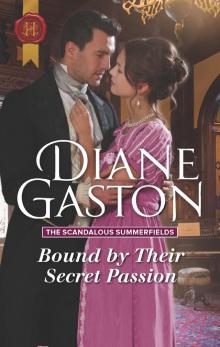 Bound by Their Secret Passion
Bound by Their Secret Passion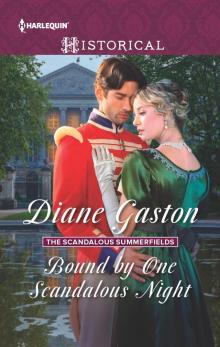 Bound by One Scandalous Night
Bound by One Scandalous Night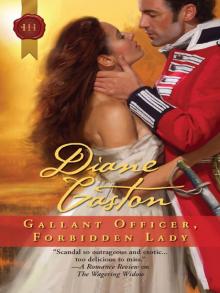 Gallant Officer, Forbidden Lady
Gallant Officer, Forbidden Lady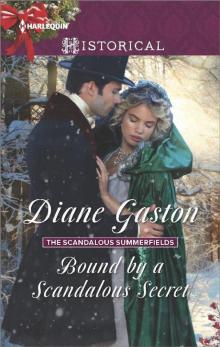 Bound by a Scandalous Secret (The Scandalous Summerfields)
Bound by a Scandalous Secret (The Scandalous Summerfields)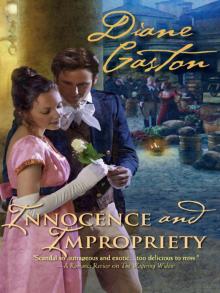 Innocence and Impropriety
Innocence and Impropriety